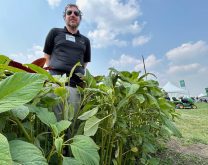Can a pill made from chicken feet and cow hides give your skin a younger, healthier look?
Yes, says University of Alberta food scientist Mirko Betti, an expert on modifying animal proteins from meat byproducts.
Betti is currently extracting collagen from poultry skin, feet, bones, and cartilage as well as bovine hides. Collagen is a natural protein that becomes “cross-linked” as we age, and injecting or ingesting the protein can help prevent signs of aging, such as wrinkles. It contains peptides, and research has found they stimulate fibroblasts, which are the cells involved in skin regeneration. Collagen peptides are already available for sale as capsules or gel pills, with a bottle of capsules fetching $20 to $40.
Read Also

From winter soil to bountiful crops: Alberta’s ultra-early seeding experiment
Southern Alberta farmers are putting research into practice, pushing ahead traditional seeding times by months for spring wheat and durum.
That got Betti and the other researchers on his team thinking about extracting collagen from livestock byproducts, which are normally incinerated or used in pet foods. He has developed a unique process — involving enzymatic hydrolysis and then combining hydrolyzed collagen with amino-sugar glucosamine — that makes it more readily available to the body.
- From the Manitoba Co-operator: The sunshine vitamin
The majority of gelatin peptides on the market are made from bovine, swine and fish gelatin and aren’t as effective, said the associate professor.
“There are problems with solubility and bioavailability,” he said. “Our technology improves the solubility and bioavailability of peptides by developing a particular cocktail of enzymes.”
Demand for nutraceutical cosmetics is growing, and Betti said he was approached by an Alberta company a couple of years ago looking to get into the market.
“They were looking for Alberta byproducts because even our bovine hides are of better quality compared to the U.S.,” he said.
And even if younger-looking skin isn’t at the top of your wish list, collagen may find its way into your diet.
Betti said he’s heard Nestle wants to add collagen peptides to an instant coffee product sold in the Far East.
“In Asia, they have the concept of food as a medicine, so all of the byproducts are something precious rather than something to be discarded.”
Betti’s collagen research project will be finished by 2015. It’s funded by the Alberta Livestock and Meat Agency and Alberta Innovates Bio Solutions.
















